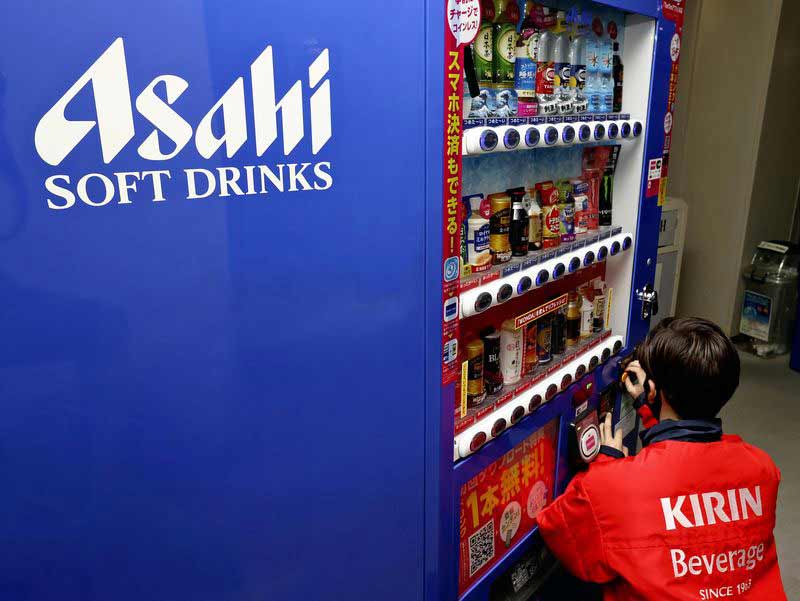
A Kirin Beverage employee performs maintenance on an Asahi Soft Drinks’ vending machine in Sumida Ward, Tokyo.
November 25, 2021
The market for soft drinks, such as coffee and juice, has been shrinking as fewer people using vending machines has led to there being fewer machines available.
Soft drink production in 2020 declined for the second year in a row.
In addition to the low birthrate, the aging population and a growing health consciousness in society, consumers have fewer opportunities to go out amid the pandemic, meaning fewer purchases.
The reduction in vending machines — a major sales channel for the soft drink market — has also contributed to the drop in sales. Beverage companies are working to combat this by introducing new products.
The production volume of soft drinks in 2020 decreased by 4.9% from the previous year to 21.57 million kiloliters, according to the Japan Soft Drink Association. Canned coffee and beverages in small plastic bottles, which are often consumed in offices, saw a significant decline.
The beverage market was hit by workers telecommuting more and people refraining from going out due to the pandemic, meaning fewer consumers using vending machines in offices and at tourist spots.
Inryo Soken’s survey showed that vending machines accounted for about 30% of all soft drink sales channels as of 2019, second after supermarkets.
The pandemic did not significantly reduce the number of consumers who go to supermarkets to buy groceries and other items, but it did create a headwind for the sales of beverages from vending machines.
Stretched thin
Beverage firms are struggling to maintain all of their vending machines due to a lack of manpower for maintenance, management and restocking products.
The diversification of purchasing methods has also contributed to the problem such as the growing popularity of online shopping.
There were 2.02 million soft drink vending machines nationwide as of 2020, down about 10% from 2013, according to the Japan Vending System Manufacturers Association.
Some progress in cutting costs has been made in the industry such as Asahi Soft Drinks Co. outsourcing the maintenance of its vending machines to Kirin Beverage Co. in some areas.
While beverage companies struggled to sell their products in vending machines, more and more people began enjoying making tea or coffee at home last year due to the “stay-at-home” lifestyle idea.
The sales value of Japanese tea in 2020 rose by 2.7%, and black tea leaves by 5.1%, compared to the previous year, while regular coffee for home use grew by 10.9%, according to research firm Intage Inc.
Health drinks
Beverage manufacturers are attempting to boost sales by introducing new health-conscious products in vending machines.
In October, Kirin Beverage launched Gogo no Kocha and Namacha tea beverages containing “L. lactis strain plasma.” Suntory Beverage & Food Ltd. has launched The Strong natural sparkling water — a sugar-free and strongly carbonated drink.
However, many companies are still implementing telecommuting even after the state of emergency was lifted. There are also concerns of the pandemic taking a turn for the worse in the nation.
“It will be difficult for the soft drink market to recover to the level of 2019, the year before the coronavirus disaster occurred,” said Credit Suisse Securities Ltd. analyst Rei Ihara. “Companies will need to review their sales channels and take other measures to boost profits.”
Top Articles in Business
-

Prudential Life Insurance Plans to Fully Compensate for Damages Caused by Fraudulent Actions Without Waiting for Third-Party Committee Review
-

Narita Airport, Startup in Japan Demonstrate Machine to Compress Clothes for Tourists to Prevent People from Abandoning Suitcases
-

Japan, U.S. Name 3 Inaugural Investment Projects; Reached Agreement After Considerable Difficulty
-

Toyota Motor Group Firm to Sell Clean Energy Greenhouses for Strawberries
-

SoftBank Launches AI Service for Call Centers That Converts Harsh Customer Voices into Softer Voices
JN ACCESS RANKING
-

Japan PM Takaichi’s Cabinet Resigns en Masse
-

Japan Institute to Use Domestic Commercial Optical Lattice Clock to Set Japan Standard Time
-

Israeli Ambassador to Japan Speaks about Japan’s Role in the Reconstruction of Gaza
-

Man Infected with Measles Reportedly Dined at Restaurant in Tokyo Station
-

Videos Plagiarized, Reposted with False Subtitles Claiming ‘Ryukyu Belongs to China’; Anti-China False Information Also Posted in Japan





















